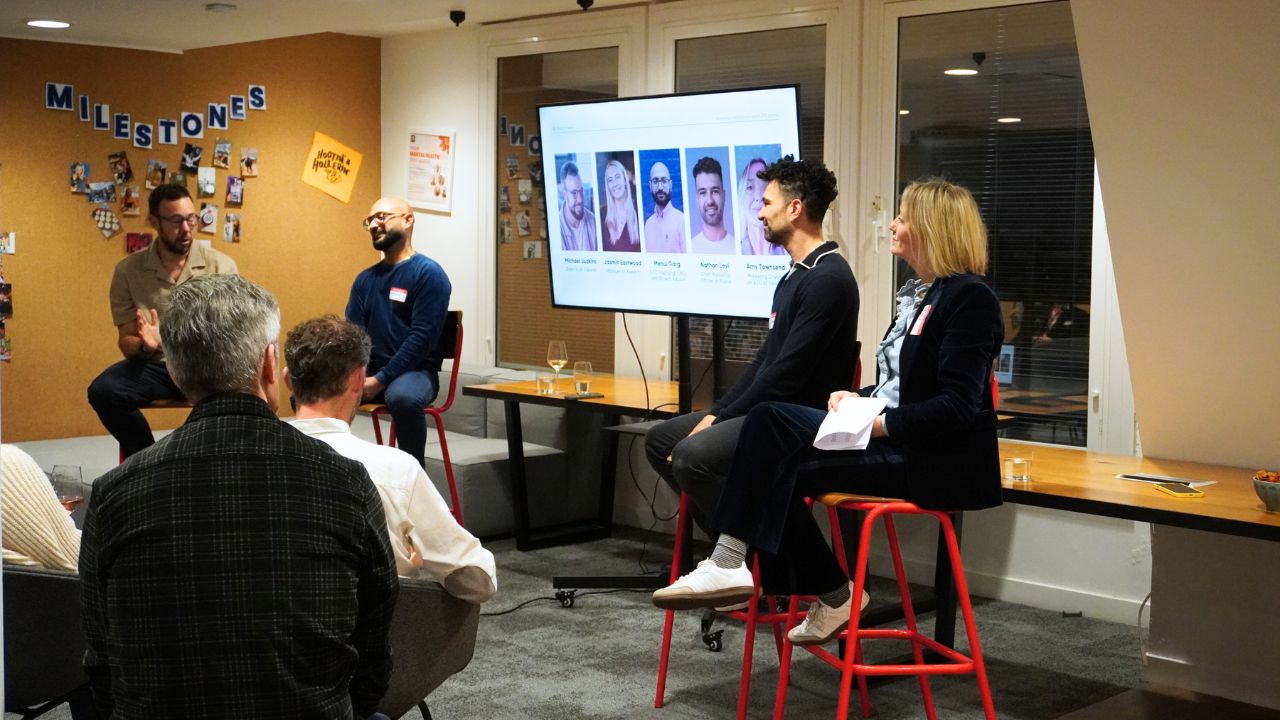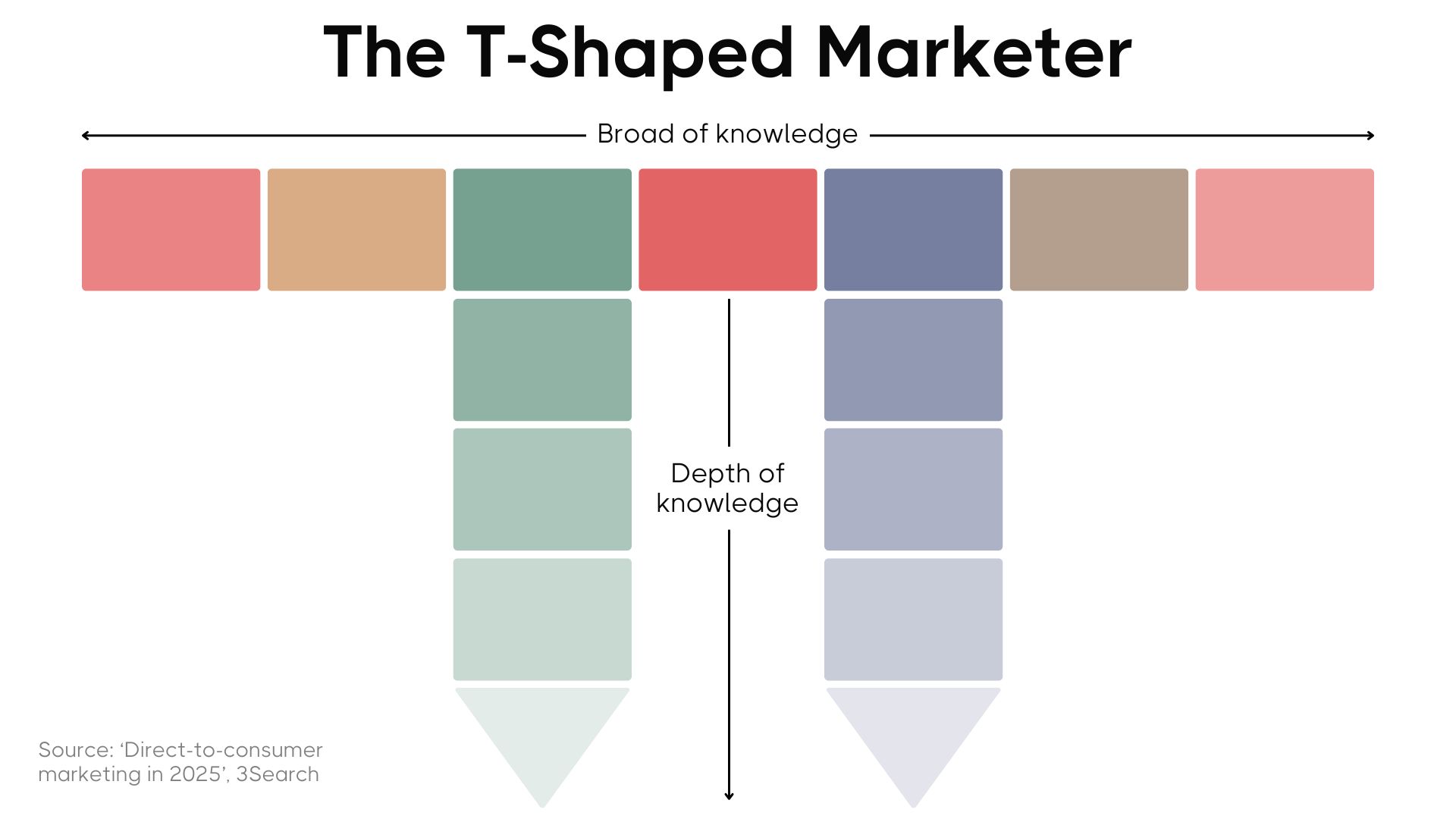Upload Your CV
Send us your CV and a member of the team will be in touch to discuss open opportunities with you.
This article reveals the key takeaways from our event exploring how to unlock marketing succ...

This article reveals the key takeaways from our event exploring how to unlock marketing success in direct-to-consumer (DTC) brands. An excellent resource for Marketing and Business Leaders as they start planning for the year ahead.
On Wednesday, 13th November 2024, Jasmin Eastwood and Michael Judkins hosted a seminar event for leaders in the direct-to-consumer industry. Attendees heard from three leading marketers who have specialised in DTC marketing for a combined total of 20+ years:
Together, they discussed how scaling and established DTC brands can unlock digital marketing success in 2025 and beyond, covering topics such as:
Keep reading to uncover the key takeaways from the conversation.
Digital marketing skill sets have evolved in recent years – moving alongside the tools and technologies – to continue serving customer expectations. As we head into 2025, we kicked off the conversation by asking our panellists which skills they believe are most important to marketing success in DTC companies.
Amy Townsend raised the importance of having the right attitude to work in direct-to-consumer marketing. People who tend to thrive in the industry are curious and adaptable. These skills have been required over the past few years as marketing trends and channels have evolved. Our speakers predict that they will continue to be important into the new year as these changes continue.
Curiosity goes beyond a surface-level interest in results. It’s about delving into how the brand works, how it makes money and how customers consume the product or service. As a marketer, you need to understand the customer journey and be able to align marketing efforts across the business.
Adaptability has become equally vital. Even the best laid, long-term marketing plans can fall through. With digital channels changing rapidly, it’s important to be adaptable and resilient in the current market.
Mehul Garg highlighted how the evolution of marketing skills is intrinsically linked to the broader changes within the industry.
In the earlier stages of DTC, brands focussed on customer acquisition, prioritising growth at all costs. However, we have now seen a shift toward a more holistic approach, encompassing acquisition, retention, conversion rate optimisation and brand.
This transition has created a demand for marketers who can:
Nathan Levi agreed that while the core principles of marketing remain consistent, the tools, platforms, and expectations for marketers have shifted significantly.
“Acquisition teams are more like growth marketers now.”
He highlighted that performance marketing roles in particular have undergone a transformation. Changes in data accessibility and platform rules, such as those implemented by Meta, Apple, and Google, have limited targeting and optimisation opportunities.
This has forced the responsibilities of performance marketers to change. Where one part of their role has disappeared, they have adapted and replaced those skills with others – once again highlighting the importance of adaptability in modern day marketing.
To accommodate these changes and continue marketing to your target audience, there are certain roles that DTC brands should consider adding to their marketing teams.
With adaptability being at the forefront of the conversation, Michael first asked for our speakers’ thoughts on hiring generalist marketers versus channel specialists. The answer largely depends on the stage of growth you’ve reached, and which channels work well for your brand.
Nathan shared that he focuses on hiring for “T-shaped marketers” in his current role at Popsa.

T-shared marketers have a strong understanding of 1-2 skills, as well as broader knowledge across different marketing disciplines, too. Generalist marketers work well for scaling DTC brands, as they allow for flexibility in marketing strategies. Hiring someone too specialist, too early, will slow down growth.
However, there is merit in hiring specialists for channels that you see profit in. Nathan says, “You’ll hire specialists when you’ve reached critical scale on a channel, and you can justify ROI on that hire.”
We have seen a growing demand for Creative Strategists (sometimes known as the Full Stack Content Creator or Head of Brand) over the past 12 months. It seems to be the hottest role in the market. Each of our speakers have brought the job title into their teams and Mehul went on to predict that they will continue to be in high demand over the next 5-6 years.
But what is the role and why is it so popular among DTC marketing teams?
Creative Strategists are responsible for both interpreting data and crafting creative concepts that drive engagement. Their ability to target customers, develop storyboards, and produce assets at scale makes them indispensable.
Why? Brands must move away from traditional production cycles to meet the growing demand for high-volume, short-lifespan digital ads on social media platforms, such as Instagram and TikTok. Plus, with creative now accounting for up to 70% of a campaign's value, this hybrid role is becoming a vital team member in every digital business.
The conversation naturally shifted on to the digital marketing trends and challenges they’re seeing in the market. Our speakers looked ahead and shared their predictions for the future.
Perhaps a controversial point, Mehul shared that direct-to-consumer is not a business model but a distribution channel. This means that more and more brands are no longer solely trading on their own sites, with the likes of Amazon and TikTok Shop quickly becoming core distribution channels.
“DTC is not a business model. It’s just a distribution channel.”
Amazon and TikTok Shop have emerged as critical sales channels, offering accessibility to broader audiences and acting as a "safety net" for DTC brands looking for investment. The challenge here is prioritisation.
By diversifying distribution channels, there has been a shift in how companies reach potential customers.
Our speakers emphasised that user-generated content (UGC) has become a cornerstone of successful DTC marketing strategies, particularly on platforms such as TikTok. This type of marketing is authentic and relatable, driving engagement and connecting brands with audiences.
However, UGC comes with challenges. Marketers must come to terms with a lack of control over messaging, as natural, authentic content performs well on these channels. Brands must strike a balance between guiding creators and allowing them the freedom to craft genuine content that resonates with their audiences. Plus, to see the right results, you must build a deliberate strategy to work with specific creators and segments to ensure brand consistency.
One of the biggest challenges raised for 2025, was the balance of growth and profitability in the current economy.
Nathan noted that investor expectations for simultaneous profitability and growth often force brands into short-term thinking. We begin to see marketing teams rely heavily on paid channels to deliver quick results. However, brands should be cautious of this approach, as it can strain budgets and undermine sustainable growth strategies like brand building or customer retention.
Brands should find a balance by focusing on initiatives that align with both short-term performance and long-term scalability.
A big thank you to our speakers for your time and insights on the direct-to-consumer market. If you missed this event and would like to join us at our next one, be sure to keep an eye on our LinkedIn and connect with our recruiters.
If you’re looking to expand your digital marketing team for 2025, get in touch with 3Search for the best recruitment experience you will ever have!